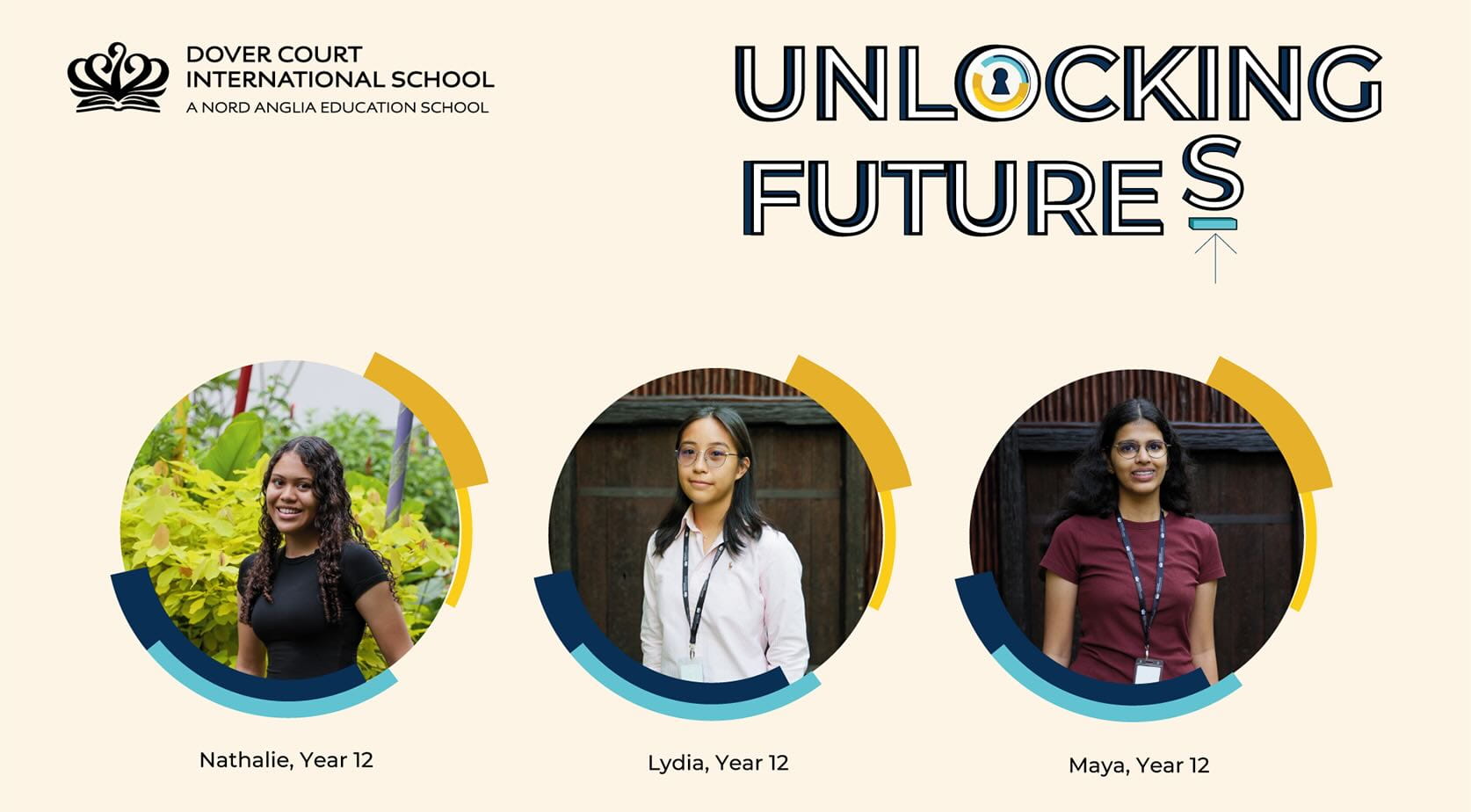We use cookies to improve your online experiences. To learn more and choose your cookies options, please refer to our cookie policy.
Join Dover Court this January!
Limited places still available in select year groups - Enquire Today

We recently announced the fantastic achievements of our students in the I/GCSE examinations. The International /General Certificate of Secondary of Secondary Education (I/GCSE) is the world’s most popular international qualification for 14 to 16-year-olds and a great preparation for the next step of the educational journey, such as the IBDP or BTEC.
Three of our students, Nathalie, Lydia, and Maya share their experiences from the 2024 I/GCSEs. They are currently in Year 12 and pursuing the International Baccalaureate Diploma Programme (IBDP). Here’s a glimpse into their I/GCSE journey, choices, and the insights they've gathered along the way. Whether you're preparing to make your selections or need some inspiration, these insights are valuable.
Nathalie emphasises the importance of choosing subjects that truly ignite your interest rather than those presumed to be ‘easy’. Nathalie’s advice for Year 11 students is to leverage flashcards for effective study and content retention, underscoring that genuine interest in a subject naturally fosters excellence.
“My favourite core subject is maths because I enjoy problem-solving and doing complex questions! My option subjects were drama, psychology, business, and geography. Psychology is the subject I enjoyed the most out of these four. I like learning about why certain people act the way they do and what factors (both biological and environmental) can affect behaviour.
My best advice is that you must never pick subjects based on how 'easy' you think they are. Instead, choose those you have a genuine interest in because those are the ones you will naturally do well in. The biggest tip I can give Year 11 students is to use flashcards to study and learn content!” – Nathalie, Year 12 Student
Lydia found her passion largely in mathematics and biology. She appreciated the problem-solving in mathematics and the extensive information biology provided. Among her option subjects of history, global citizenship, and psychology, psychology truly captivated her interest, leading her to consider further exploration in this field.
“I really enjoyed both mathematics and biology. I enjoyed the problem-solving aspect of mathematics, and I found biology the most interesting subject in terms of content. I took history, global citizenship, and psychology. I enjoyed all my options, but psychology was my favourite. It exposed me to the widest variety of subtopics, from criminology to development. Taking psychology has solidified that it’s a subject I’d like to pursue in the future.
My advice is to pick a subject that you enjoy and are interested in, as this will help motivate you to revise. Don't pick your options based on what your friends are taking, as this is a subject that you will have to study in-depth for three years, and a lack of interest will make it difficult to do well in it. Find a revision technique and place that works best for you and remember to take breaks while revising. Don't put too much pressure on yourself for mocks; use them to gauge whether your current revision techniques are working and your knowledge of the syllabus. There will be time after the mocks to improve, so pace yourself and don't burn out too early.” – Lydia, Year 12 Student
Maya's favourite option subject was psychology because it offered fascinating insights into human and societal behaviour. She recommends using comfortable revision methods and customizing strategies for each subject, such as using flashcards for English and practising past paper questions for maths.
“I liked science, especially chemistry, the most out of all the core subjects. I found science very interesting because, within the subject, there was a lot of scope for learning a variety of topics. My optional subjects were geography, psychology, Spanish, and business. I enjoyed psychology the most because it was very compelling to learn about the behaviour of humans and societies and how what I learned would apply to real-life situations.
I think the best advice when choosing your subjects would be to balance your interests and strengths because it will become quite tedious if you are not interested in a subject. My revision top tip is to use a method you are comfortable with to revise and help you memorise the content. Additionally, use different study methods that are best suited for specific subjects. For example, in English, using flashcards would be useful to memorise quotes, whereas in maths, using past paper exam questions would be effective.” – Maya, Year 12 Student
The experiences of Nathalie, Lydia, and Maya all highlight a common theme: achieving success in I/GCSE exams requires a combination of passion, personalised study techniques, and a mindful approach to learning and revision. Choosing subjects that align with your interests, finding methods that suit your learning style, and maintaining a balanced approach to study and rest are the guiding principles shared by our students to help future candidates navigate their I/GCSE journey. We hope their insights inspire and guide other students as they embark on this exciting educational adventure in the future.